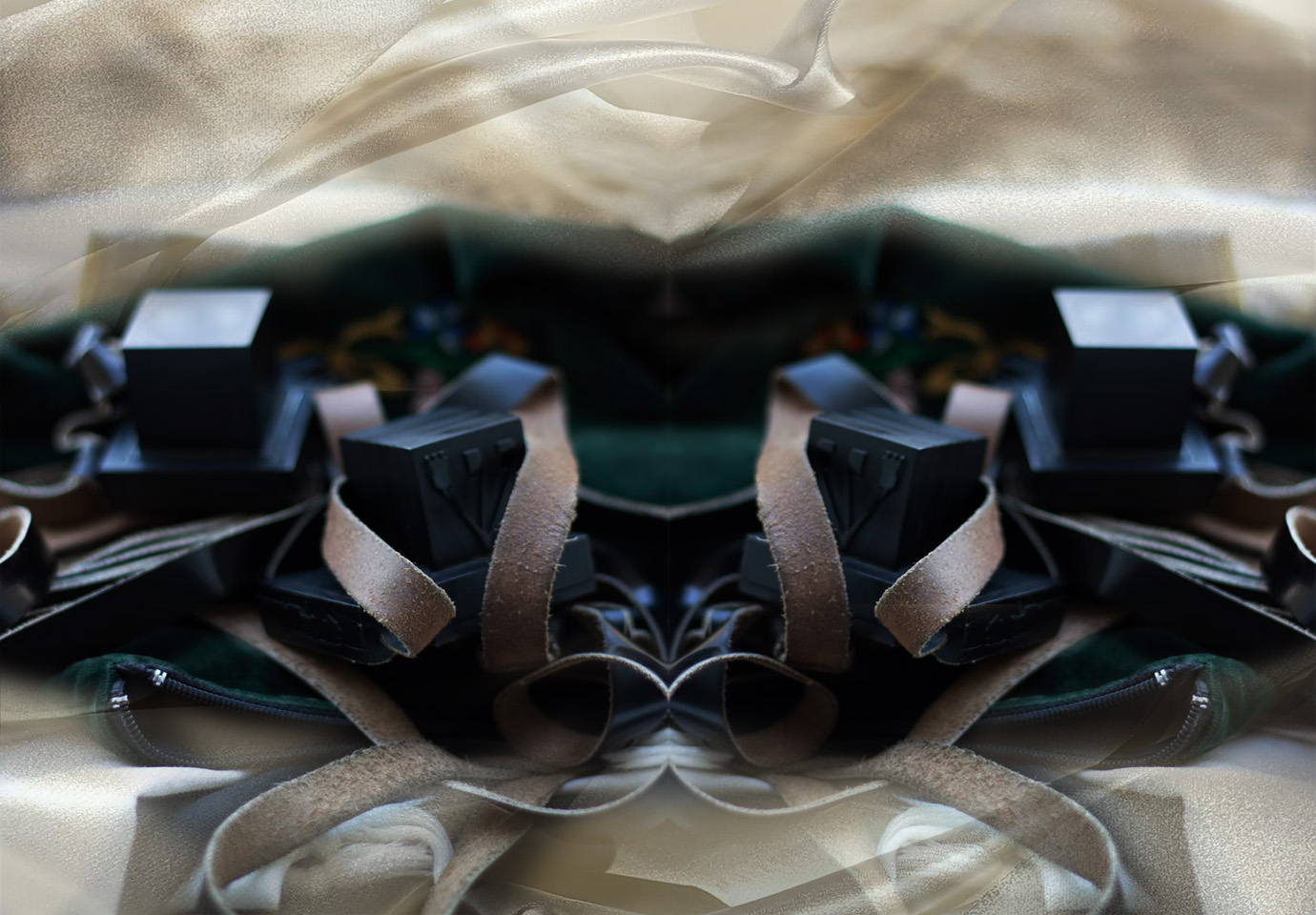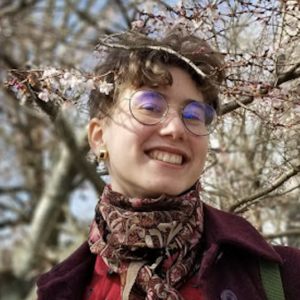I snuck into my father’s closet while no one was home. My father was shopping at Zabar’s, my mother was at her zumba class, and my brother was out playing basketball with the other shul boys. I was fourteen, home from school when I could have been out with friends, but the people I called friends then weren’t really, so I made an excuse to stay home instead.
The end of the school year was fast approaching. The air was getting heavier as the sun grew stronger and the tall city buildings closed everything in. Soon it would be hard to breathe in the thickened heat. Hard to walk without skin sticking to skin. Hard to think while my mother and father kvetched about everything. Hard to pray without the fan blaring, drowning out whispered morning prayers.
The moment I touched the small golden handles of the white-painted, wooden closet doors, relief flooded through me. I opened the door and stepped inside, closing it behind me. Inside smelled of cinnamon from the time my brother knocked over the smelling herbs right after havdalah, trying to put them away after Shabbos maybe three years before. I breathed in the comfort of spice soaked into carpet.
Usually I’d only visit my father’s closet to find wrapping paper for friends’ birthday gifts, and even then he’d be there beside me to help. I don’t really know why he felt the need to hide the wrapping paper in a different spot every year. He hid everything. One of his quirks.
With that thought itching at me, I took a stool with me into the closet to get to the high shelves, pushing aside binders of photos and pages of paper scribbled on with crayons and sharpies from when me and my brother were little. My hands touched everything, from cool metal to warm winter wool, not stopping until they hit the coarse touch of velvet. A hard rock of determination knotted itself somewhere by my kidneys. I pulled down a small purple velvet bag, slightly worn, with illegible golden Hebrew embroidered onto it. I sat on the stool, stroked the golden letters out with my thumb, trying to make out the shape of a word with my rudimentary Hebrew.
On the eve of my brother’s Bar Mitzvah, probably thinking about the fact that after the next day, he would be finally allowed to wear his own tefillin, my brother had asked my father why he hid them in the closet.
My father shrugged. What if the Nazis knock down our door?
My mother laughed. They’d have to knock down the doorman and climb up ten flights of stairs first and by then, all his hatred would have been schvitzed out.
I had wondered, spite seeping into my thoughts, why they were important enough to hide in the first place.
Of course I knew why. But also, not really.
I played with the zipper, lifting the pull tab up and down.
An image of my father praying in the morning came to mind. Him, facing east, rocking back and forth in front of his bed, mumbling prayers with black leather straps wrapped around his head, black box between his eyebrows, and down his left arm all the way to his middle finger, the other box on his bicep. Longing and fear spread against the back of my tongue like the sour aftertaste of shul wine, something I thought that I would never touch again if I could help it.
In my hands were my father’s tefillin.
An urge came over me; frustration and memory hardening and cooling into a small stone. I stood up, placing the bag on the stool. I unzipped it, halfway like I’d watched my father do from a crack in my parents’ bedroom door, and removed an old delicate black strap wrapped methodically around a black box. I cradled it in my hands, the forbidden material resting against my fingertips.
When I was young, very young, I had interrupted my father during his morning prayer, just for his attention. Good-naturedly, he had let me, even lifting me up in his arms. When I tried to remove the tefillin from his head, he jerked away. Thinking it was a joke, I continued and managed to grab the box off of his head. I put it on mine, grinning. He quickly took it back, sitting me down on his bed, telling me this was not something girls were allowed to do. Telling me I had to be careful with the tools people use. He gave me a list of prohibitions: yarmulkes, tefillin, glasses, canes. Don’t touch others’ things.
In the closet, I tried to roll up a sleeve, but the shirt was too tight to go up my bicep. Frustrated, I took my whole shirt off, let it fall to the carpeted floor, and stood there in only a bra. I removed the small covering from the black box the straps were connected to and kissed it as my father had done. I placed the box on my right bicep, holding it down with my forearm. I knew there were words I needed to say but I bit my lip, unsure of what they could be as I tightened the leather strap and began wrapping it around my arm: once around the bicep and seven times around the forearm with the smooth black side facing outward.
I paused and shut my eyes. My grandfather’s alarm clock, hidden along with everything else my father found important, ticked away softly in the background. The tightness of the straps was comforting, but it wasn’t close enough. I needed it closer.
I unwound the strap from my arm and began delicately winding it around my chest, my fathers voice filling my ears with outrage, until my breasts were small bumps of muscle with the box between them.
The small knot by my kidneys unclenched. A soothing warmth spread through my chest from the base of the black box as if it were melding itself to my skin, becoming a part of my body.
The straps lay cold against my chest in the overheated apartment. My body was stronger, more compact, and able to move freely. I looked down and saw the soft lines of my stomach without the hindrance of extra flesh. The curves of my body stood out, showing me someone I had never seen before.
But I wasn’t done.
I unzipped the bag the rest of the way and removed the other strap. I repeated the same process as before, uncovering the box and kissing it, this time placing the smaller loop over my head with the box just above my hairline. I adjusted the knot at the back of my head so that it wouldn’t fall too low. The straps that dangled behind me, I rested by my braids, with the shining black side facing outwards, framing the box between my breasts.
I brushed my hand over my chest, feeling the smooth leather. It was as if I was fitting into my body for the first time. Restricted in its becoming, centering itself around a small black void, diligently repairing the strangely shaped vessel that was my pubescent body.
A wordless prayer danced on my lips and on the tip of my tongue. Something wanted to be said, but I didn’t have it yet. Instead, I emitted a low hum.
I was almost three years old again, sneaking into the men’s side of the shul, and my father was indulging me by holding me on his lap. My mother couldn’t come get me, the flimsy and plastic divide between the sexes was too strong a barrier; she could only peer around it and make sure I was OK. My brother was yet to be born, incubating inside of my mother’s rounded stomach, and therefore couldn’t yet shoo me away, whining that I was a girl and that this space was for boys. Here, my father had no reason to tell me no. I was still too young for it to matter where I sat. On his lap, I could feel the deep lull of the men’s voices. I could see the Torah, closer than I ever could before. I almost had it, it was almost mine.
The girl just wants her father, he told my mother after the service. Is that such a crime?
I stood there, in my father’s closet, looking up at the cracked white paint of the ceiling, hoping God would hear that I was man, woman, and everything too. I stood up on my toes.
I am in God’s image.
I tried to raise my arms up, but I worried I would break or unravel my delicate bindings.
God has no image.
I lifted my nose up to the sky, inhaling the cinnamon deep into my bones.
God is in me.
The black box on my chest slipped slightly; it wasn’t meant to be there.
I can be imageless too.
I looked at my grandfather’s clock and lowered my half-risen arms.
My time was up.
I unwrapped myself from my bindings, reincased the boxes, wrapped each strap with careful precision, and returned them into the bag, and the bag on the top shelf behind my father’s odds and ends. Reluctantly, I put my shirt back on and left the closet to turn on the air conditioning.
My father came home to me sitting and reading the New York Times at the dining room table.
West Side Diner is closing. I said, pointing at the small article.
Ach, let it. I don’t care if the window says they’re kosher. They served me pork once.
He disappeared into our small kitchen and returned with two plates of open-faced bagels schmeared with scallion cream cheese and accordioned lox. He placed one plate in front of me, sat down, and talked about my future children, how he would read to them and make them his famous borscht.
I’m fourteen. I said.
So? He replied with a shrug. Someday you’ll meet a nice Jewish boy, you’ll have ten kids, and call me over to take care of them.
I shuffled the Times, feeling the echo of the box on my chest.
OK, Daddy, I said.

